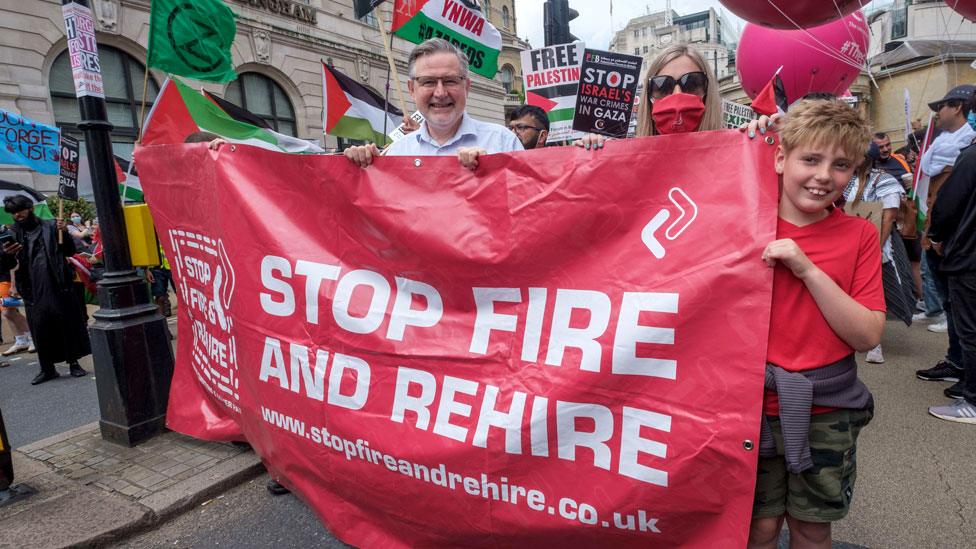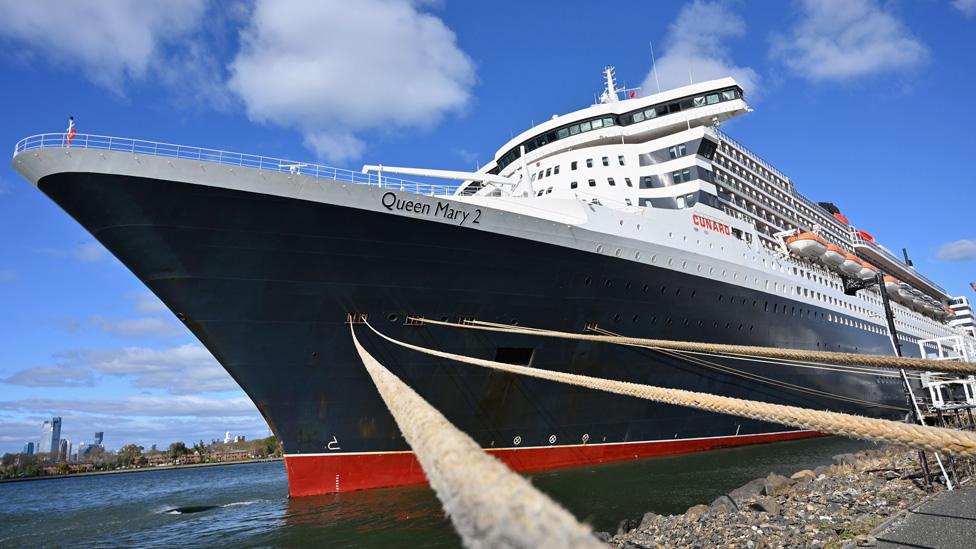Fire-and-rehire: What is it and why is it controversial?
- Published

Tesco has lost a Supreme Court battle over so-called "fire-and-rehire" plans put forward by the supermarket giant.
The row began in 2021 after Tesco proposed firing staff at some distribution centres and rehiring them on lower pay, prompting the Usdaw union to take legal action.
During the pandemic a number of big businesses tried to dismiss workers and hire them back straight away - on worse deals.
It prompted calls from trade unions and opposition politicians for employment rights to be strengthened including banning the practice, commonly known as "fire-and-rehire".
The most noticeable case was that of P&O Ferries, which fired 800 of its workers in 2022. It was not accused of adopting a straightforward "fire-and-rehire" strategy, because it used an agency to replace sacked staff.
But unions said there were lots of overlapping concerns particularly around job security.
What is fire-and-rehire?
Employers sometimes want to change the terms and conditions of their workers.
Each case is different, but employers might want to reduce their pay, or reduce holiday allowances, change shift patterns - even reduce the breaks they are allowed.
This will often happen when a company is losing money and needs to cut costs to stay in business.
Normally, managers would negotiate with trade unions or workers' representatives to try to reach an agreement.
If they can't, employers sometimes dismiss the affected workers, and offer to hire them back on the same day - under new terms and conditions.
That presents workers with a stark choice - accept worse terms and conditions which you said no to before, or lose your job.
It's not illegal but it is considered acceptable only as a last resort.
Which firms have been in the headlines?
Tesco was blocked from firing and rehiring its workers on lower pay, external in September, with Supreme Court judges calling the expectation "unrealistic".
In 2023 trade unions accused Carnival UK, which operates P&O Cruises and Cunard, of considering using the strategy, although the firm said it was "categorically" not making any redundancies.
Unions compared Carnival's approach to what happened at P&O Ferries - which is owned by a completely separate company, DP World.
In that case there were some reports that sacked workers were told they could reapply for their old jobs via the agency that was filling their vacant roles if they wished to, which would have made it something very like a "fire-and-rehire" strategy.
The controversy around fire-and-rehire had already become more intense following the pandemic.
Many companies lost business because of Covid, and some used fire-and-rehire to reduce the amount they spend on their workers.
Len McCluskey, the then-leader of Britain's largest trade union, Unite, called it "a disease that is ripping through our workplaces" at the time.
High-profile disputes about alleged fire-and-rehire tactics include:
Bus company Go North West
Coffee maker Jacobs Douwe Egberts

Has fire-and-rehire become more common?
The government does not record the number of times fire-and-rehire happens. A report commissioned by the government in 2021, external found little hard data about how many disputes there are.
But in the aftermath of the pandemic, a survey of workers by the Trades Union Congress, external in January 2021 found that 9% of workers had been told to reapply for their jobs on worse terms and conditions since March 2020.
Many of the people the researchers spoke to said they felt the practice was becoming more common, not just among big companies, but smaller employers too.
Some said more companies are turning to fire-and-rehire early in negotiations as a threat, rather than at the end of the process when all other options have failed.
Can fire-and-rehire be fought in the courts?
The Usdaw union successfully challenged Tesco in the courts when it tried to fire and rehire some of its distribution workers, although it was a hard-fought battle.
Usdaw won an injunction in 2022 which stopped Tesco from carrying out its plans, but Tesco successfully got that ruling overturned on appeal, prior to losing at the Supreme Court.
Fire-and-rehire is not illegal, but employers have to follow a long process, formally consulting workers and unions and observing set notice periods.
If it is not followed correctly, employers open themselves up to legal challenges through employment tribunals or the courts.
Employees and unions can also challenge a fire-and-rehire process on the grounds that it is not done fairly - for example, if some groups of workers get better treatment than others.
Will fire-and-rehire be banned?
Labour pledged that it would ban fire-and-rehire in its 2024 election manifesto, and, after the Tesco ruling in September, the government said it intends to bring forward legislation to do that "soon".
A spokesperson said the government wanted to "put an end to unscrupulous fire-and-rehire practices, which have no place in a modern labour market".
How does fire-and-rehire affect my long-service rights?
Many employment rights only start after two years' service. Until then workers can be dismissed with a week's notice.
At many firms, employees acquire more rights - such as better redundancy terms - the longer they work.
In most cases, going through a fire-and-rehire process should not reset years of service back to zero, says Neil Todd of Thompsons Solicitors.
Long-serving employees should not be treated as new hires if they are dismissed and rehired straight away, or even as late as the following week.
Related topics
- Published24 November 2023
